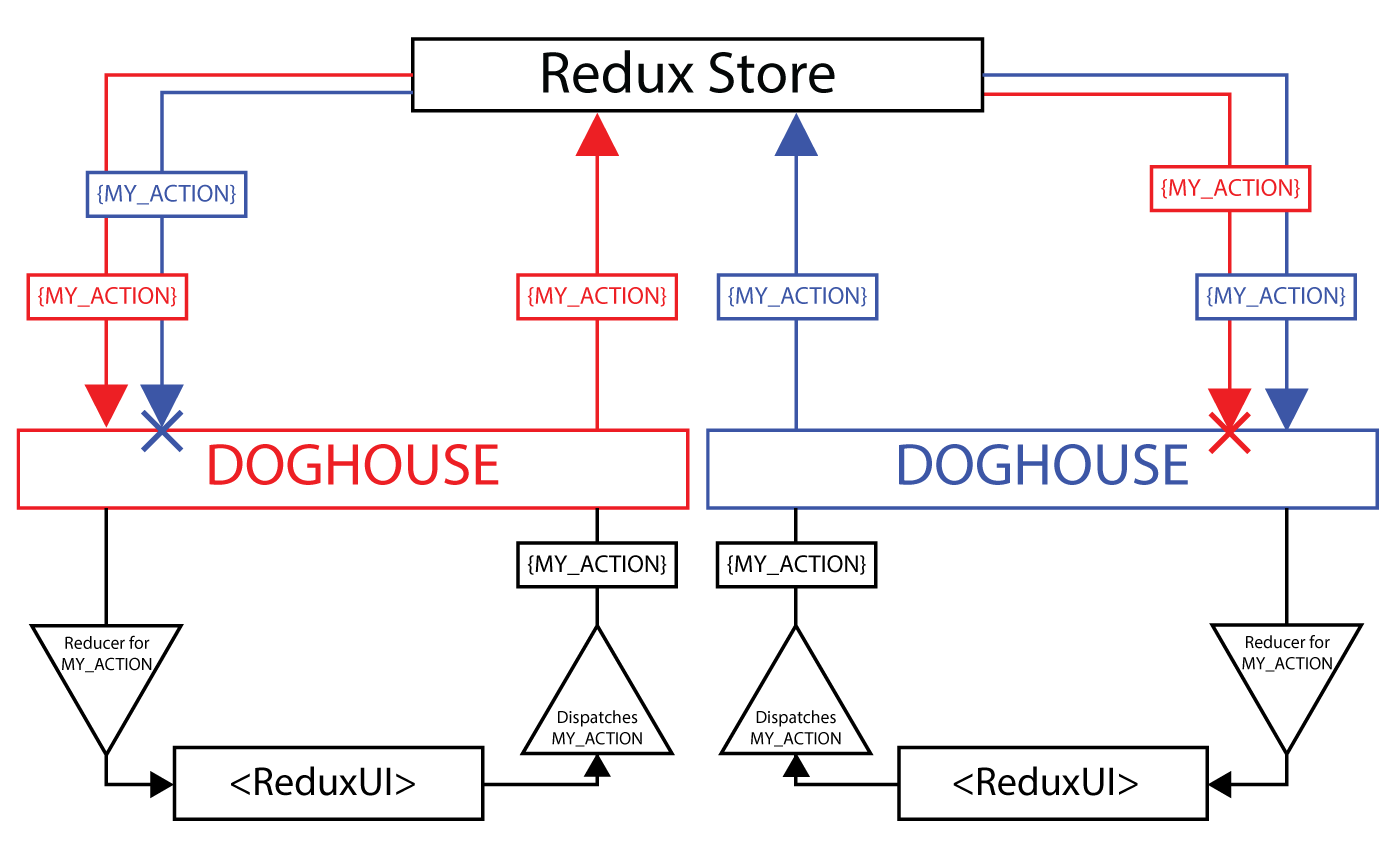redux-doghouse
redux-doghouse is a library that aims to make reusable components easier to build with Redux by scoping actions and reducers to a particular instance of a component.

It includes tools to help you build Scoped Actions and Scoped Reducers with minimal modifications to your code. That way, if you build a Redux store for a Parent with an arbitrary number of Children (meaning there can be none, one, or a million of them), actions affecting Child A won't affect Child B through Child Z.
You can read more about why we built redux-doghouse, and our real-world use-case, in this blog post.
Getting Started
Installation
npm install redux-doghouse
Running Examples
Counters (Live Demo)
An app that renders an arbitrary number of <Counter>s, with the ability to change the value of one of them at a time, all of them at once, or only the ones with even or odd numbers
npm run counters
API
- scopeActionCreators
- ScopedActionFactory
- bindScopedActionFactories
- bindActionCreatorsDeep
- scopeReducers
For Actions
scopeActionCreators(actionCreators, scopeID)
Adds a scope to the output of a set of action creators
The actionCreators should be in the same format that you would pass to bindActionCreators. e.g:
type: SET_FOO valueor
type: SET_FOO valueIt will then scope each of these action creators, so that the resulting action will include the scopeID.
type: SET_FOO value scopeID: "[the specified scopeID]" Arguments
actionCreators(Function or Object): An action creator, or an object whose values are action creators. The values can also be nested objects whose values are action creators (or more nested objects, and so on).scopeID(String or Number): An identifier to include in any actions created by theactionCreators
Returns
(Object or Function): An object mimicking the original object, but with each function adding { scopeID } to the Object that they return. If you passed a function as actionCreators, the return value will also be a single function.
Example
;; // Before scoping:actionCreators;// Will return type: 'SET_FOO' value: 'bar';/// After scoping:// Will return type: 'SET_FOO' value: 'bar' scopeID: 'a'ScopedActionFactory(actionCreators)
Works similarly to scopeActionCreators, but with the added benefit of instanceof checking. This allows you to write a check to see whether or not a set of action creators is an instanceof ScopedActionFactory.
For example, the included bindActionCreatorsDeep function will intelligently bind an object tree of both scoped and un-scoped action creators, depending on whether it's passed plain objects or ScopedActionFactory instances.
Arguments
actionCreators(Function or Object): An action creator, or an object whose values are action creators
Returns
(ScopedActionFactory) A class of object with the following:
Instance Methods
scope(id): Object
Runs scopeActionCreators(id) on the actionCreators that were passed to the new ScopeActionFactory, and returns the result.
Example
;; const scopeableActions = actionCreators;const actionCreatorsScopedToA = scopeableActionsscope'a';const actionCreatorsScopedToB = scopeableActionsscope'b'; actionCreatorsScopedToA// Will return type: SET_FOO value: 'bar' scopeID: 'a'bindScopedActionFactories(actionFactories, dispatch, [bindFn])
Takes an object of actionFactories and binds them all to a dispatch function. By default, it will use Redux's included bindActionCreators to do this, but you can specify a bindFn to use instead.
Arguments
actionFactories(Object or ScopedActionFactory): A single ScopedActionFactory, or an object whose values are ScopedActionFactories.dispatch(Function): A function to which the resulting action creators fromactionFactoriesshould be dispatched; usually this is thedispatchmethod of a Redux store- [
bindFn] (Function): If specified, this function will be used to bind resulting action creators to thedispatch. If unspecified, Redux's nativebindActionCreatorswill be used by default.
Returns
(Object or ScopedActionFactory): An object mimicking the original object, but with each ScopedActionFactory generating functions that will immediately dispatch the action returned by the corresponding action creator. If you passed a single factory as actionFactories, the return value will also be a single factory.
Example
;;; const store = ;const scopeableActions = myComponentActions: actionCreators;const boundScopeableActions = ;bindActionCreatorsDeep(actionCreatorTree, dispatch)
Extends Redux's native bindActionCreators to allow you to bind a whole tree of nested action creator functions and ScopedActionFactory instances to a dispatch function.
Arguments
actionCreatorTree(Object): An object whose values can be:- A Function to be bound to the
dispatch - A
ScopedActionFactoryto be bound to thedispatch - Another Object containing either of these (or more nested Object)
- A Function to be bound to the
dispatch(Function): A function to which the members ofactionCreatorTreeshould be dispatched; usually this is thedispatchmethod of a Redux store
Example
;;; const store = ; const actionCreators = fooActions: type: 'BAR' value barActions: baz: type: 'QUUX' const boundActionCreators = ;For Reducers
scopeReducers(reducers)
This acts as an extension of Redux's combineReducers, which takes an object of reducers in the form of { [prop]: reducer(state, action) } pairs and combines them into a single reducer that returns { [prop]: state } pairs. scopeReducers goes a step further and returns an object of { [scopeID]: { [prop]: state} } pairs.
In other words, it will create a reference to your reducers for each new scopeID you add to your data model, and route scoped actions to their corresponding scopeID when reducing a new state.
Arguments
reducers(Object): An object whose keys correspond to property names, and whose values correspond to different reducing functions that need to be combined into one and reused across multiple scopes.
Returns
(Function): A reducer that takes an object of state objects in the form of { [scopeID]: state } pairs, and an action that includes a scopeID. The reducer will return a new object mimicking the original object, but for each key:
- For the matching
scopeID, invoke thereducersto construct a new state object with the same shape as thereducers - Leave all the other
scopeIDs' state objects unchanged
Example
// Given these actionCreators...;const reducers = { };const actionCreatorsA = ; // Without scoping;const combinedReducers = ;const state = foo: 0;;// Will returnfoo: 1 // With scoping;const scopedReducers = ;const state = a: foo: 0 b: foo: 2;;// Will return a: foo: 1 b: foo: 2